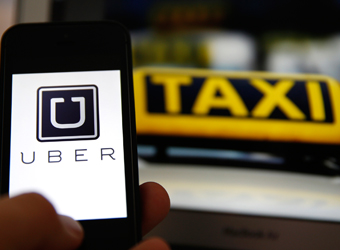Uber has lost Friday an appeal at a U.K. employment tribunal when a judge ruled that its drivers should be classified as formal workers and not self-employed.
The tribunal found that two drivers, Yaseen Aslam and James Farrar, were working for Uber and consequently entitled to a minimum wage and holiday pay, among other rights.
Uber has long argued that its drivers are self-employed rather than workers employed directly by the firm.
The tribunal’s decision is not only a challenge for Uber’s business in Britain, but for the so-called “gig economy” as a whole.
“For Uber’s estimated 40,000 drivers in the U.K., this is another positive sign that their true employment status is that of a ‘worker’ and, as such, they should be entitled to worker rights,” Alan Price, employment law director at Peninsula, said in a note Friday.
“The decision is also a further indication to ‘gig economy’ employers and companies with similar business models that they may need to reassess their treatment of their staff to ensure they are giving the correct rights.”
Another firm operating in the gig economy, online takeaway service Deliveroo, was faced with a legal challenge of its own from delivery drivers earlier this month. Deliveroo’s riders are seeking to gain employment rights including the minimum wage.
Uber has said it plans to appeal the ruling, either through Britain’s Court of Appeal or through the Supreme Court, the nation’s highest court for civil matters.
In a statement, Tom Elvidge, acting general manager at Uber U.K., said:
“Almost all taxi and private hire drivers have been self-employed for decades, long before our app existed. The main reason why drivers use Uber is because they value the freedom to choose if, when and where they drive and so we intend to appeal.
“The tribunal relies on the assertion that drivers are required to take 80 percent of trips sent to them when logged into the app. As drivers who use Uber know, this has never been the case in the U.K.
“Over the last year we have made a number of changes to our app to give drivers even more control. We’ve also invested in things like access to illness and injury cover and we’ll keep introducing changes to make driving with Uber even better.”
Appeal
Uber made its appeal to the Employment Appeal Tribunal (EAT) in September.
The San Francisco-based company argued that its model was no different to that of traditional taxi firms whose drivers are self-employed.
But Judge Jennifer Eady said in Friday’s ruling that there was a contract between Uber and drivers Aslam and Farrar, and that they “personally undertook work” for the firm “as part of its business of providing transportation services to passengers in the London area.”
Last year, Aslam and Farrar successfully argued to an employment tribunal that, as their actions were controlled by Uber, they should be treated as workers instead of as self-employed. U.K. labor union GMB hailed a “monumental victory” over the firm following the case.
Farrar, himself a union representative for Uber drivers, argued that, after commission and operating costs, drivers were earning only £5.68 ($7.46) per hour, 15 percent below the U.K. minimum wage.
The tribunal decision follows an attempted ban on Uber’s operations in London by the regulator Transport for London (TfL). TfL revoked the taxi start-up of its license to operate in the city in September. Uber then appealed against the shock move last month, which allowed its drivers to continue operating in the capital.
Criticism has been leveled at the ride-hailing business from all sides — including labor unions, politicians and traditional black cab drivers — over working conditions and regulatory concerns.
Drivers Farrar and Aslam were backed by the Independent Workers of Great Britain (IWGB) labor union during the case.
Farrar said in a statement Friday: “Uber cannot go on flouting U.K. law with impunity and depriving people of their minimum wage rights.”
He called on London Mayor Sadiq Khan, TfL and U.K. Transport Secretary Chris Grayling to “step up and use their leverage to defend worker rights rather than turn a blind eye to sweatshop conditions.”
Aslam said: “I am glad that the judge today confirmed what I and thousands of drivers have known all along: that Uber is not only exploiting drivers, but also acting unlawfully. We will carry on fighting until this exploitation stops and workers’ rights are respected.”
Jason Moyer-Lee, general secretary at IWGB, said: “Today’s victory is further proof, as if any more was needed, that the law is clear and these companies are simply choosing to deprive workers of their rights. These companies are making a mockery of supposed employment rights. The government needs to properly enforce the law and they need to do it now.”
But The Association of Independent and the Self-Employed (IPSE) criticized the decision Friday, saying that Uber drivers should not be viewed as workers employed by the firm.
“A key element of being a worker is having to turn up for work even if you don’t want to,” Chris Bryce, chief executive of IPSE, said in a statement.
“This is clearly not the case with people who drive through Uber — they choose when and how long they work for by logging on or off the app.”
Source: CNBC


